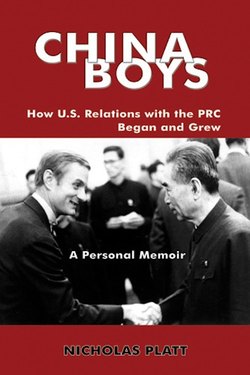Читать книгу CHINA BOYS: How U.S. Relations With the PRC Began and Grew. A Personal Memoir - Nicholas MD Platt - Страница 10
На сайте Литреса книга снята с продажи.
Convincing the U.S. Government
ОглавлениеHis advice was well taken. I may have decided to join the Foreign Service, but the service had hardly decided to join me. The entrance exams were notoriously competitive. In 1957, the first year I applied, 240 officers were chosen from a field of 14,000. Failure was common, and many subsequently successful diplomats had flunked several times. I took my first set of exams before graduating from Harvard in 1957 and fell short. The examiners said I knew nothing about economics and had to fix that. They encouraged me to try again once I had. A solid commitment to the career was rare in someone so young, they said, implying that I needed to go away and grow up some.
That afternoon, I went to call on Paul Nitze at the Johns Hopkins School of Advanced International Studies (SAIS). The father of a classmate at college (as well as Walter Maynard’s Harvard roommate), he was a founder of SAIS, former head of the State Department’s Policy Planning Staff under Dean Acheson, and a respected member of the Washington foreign policy establishment. I had consulted him earlier on the benefits of graduate school for a Foreign Service career. A blunt and friendly mentor, he had advised that I take the exams first. If I got in, the Foreign Service would train me on the job. If I did not pass, come and see him. Graduate school could help.
The two years at SAIS were stimulating and eventful. We lived in a tiny house in Georgetown and fell in love with the city that was to become our headquarters for the next thirty-five years. The school, now renamed after Nitze, was the perfect place to start learning the Washington ropes. Small then, with a student body limited to seventy-five by the size of the two converted townhouses in which it was housed, the teaching was done by international figures with years of Washington knowledge, like Hans Morgenthau, and experienced practitioners, like Roger Hilsman and Nitze himself. Papers were graded on the quality of the interviews students conducted with working officials, rather than books cited.
SAIS taught us the mechanics of Washington. My formal academic focus remained on Europe. I studied advanced German, economics, history, psychological warfare, and the balance of power. But we were lucky to get a look at loftier levels of life in the capital. The columnist Joseph Alsop, an admirer of Sheila’s mother, befriended us when we arrived in Washington. He liked to sprinkle his guest lists with younger people and included us in some of his famous Georgetown dinner parties, where he gathered the top personalities and policy makers of the day. At one of these, his cousin, Alice Roosevelt Longworth, snapped my head back with the catty observation that the vain General Douglas MacArthur hid his baldness with an “armpit comb-over.”
Paul and Phyllis Nitze took us under their generous wings and included us in weekend activities at their spectacular farm on the Potomac in Maryland. Sheila and I were close to the Nitze children and later our boys to their grandchildren. The weekends at the farm were a cozy mix of family, policy talk, and sport, featuring ferocious tennis games between people like the CIA’s Desmond Fitzgerald, Stewart Alsop, and a variety of admirals and generals. I remember asking Paul at one of these events what he thought of Secretary of State John Foster Dulles. “Foster Dulles was a bore and a fart!” Nitze replied, never one to mince words.
We started our family. Adam was born in July 1958. His first month of life was marked by a severe case of pneumonia, which almost killed him and taught his parents more about the fragility and value of life than anything that had happened before. Taking the advice of my father-in-law, I spent the summer of 1958 as a trainee at the Baltimore investment banking firm of Alex Brown and Sons, working in all their departments for a dollar an hour. We bought our first house, in the old town of Alexandria, and moved there.
I took the Foreign Service exams again. The Board of Examiners, noting that I had showed up once more, this time a year older, married, and a father, and with some real-world economic experience under my belt, decided to let me in. It took another year to complete the security and medical clearances (obtaining urine specimens from an infant was a challenge) and for the Congress to appropriate the money to bring in another class of new Foreign Service officers.
The call came in April 1959 to report to the A-100 course at the Foreign Service Institute, the State Department’s equivalent of boot camp. The choice was made.
